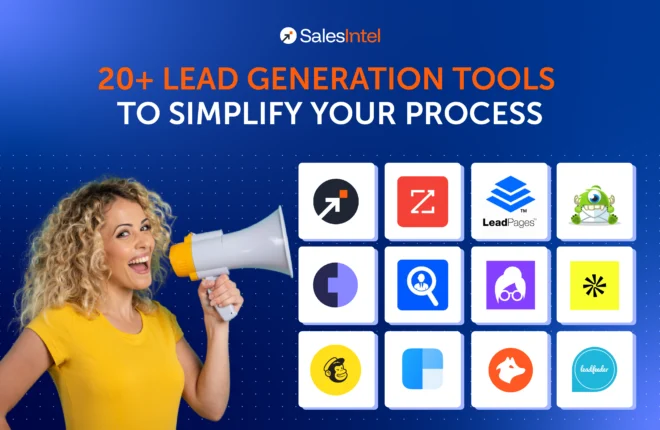For almost a century, the unchallenged sales tool used to be the telephone. Sales intelligence is now equipped with a new set of digital tools and independent thinking, ready to challenge stubborn sales and marketing directors.
Sales intelligence caters to a modern wave of analytically thought-out, tech-savvy market developers that are looking for long-term sustainable, and exponential gains instead of big quick wins.
Sales intelligence goes far beyond qualifying leads. From a marketing perspective, sales intelligence will track and analyze the digital buyer journey and allow the team to produce personalized content and predictive insights.
Let’s dive into the importance of sales intelligence going into the new year.
Why You Should Consider Sales Intelligence Going Forward
Drawing potential buyers to your company is one thing, but closing a sale is something totally different. One explanation for sales failing to close is that you might be chasing the wrong clients. Identifying the right customers is a crucial aspect of selling a product or service.
It’s easy to believe your gut feeling about your buyer persona, but without data and analytics, it’s difficult to gauge. One way to know if you’re on the right track is to use sales intelligence tools.
Sales Intelligence allows you to collect, integrate, present, evaluate, and analyze customer data. It’s the way you get relevant information about the impact of your marketing campaigns.
MarketsandMarkets estimates that the global sales intelligence market is expected to reach USD 3.4 billion in 2025 at a compound annual growth rate of 11.4% during the forecast period. The sales intelligence market growth is driven by the immediate need for advanced software to improve prospecting, segmentation, targeting, and connect rates and the growing demand for data enrichment software to improve sales conversion.
Buyers today expect personalized, relevant interactions at every point of contact. As you connect with your prospects, any piece of information about them helps give you an edge over your rivals and improves your odds of closing the sale. It’s just this type of information that sales intelligence tools can provide to salespeople.
Sales intelligence also provides sales organizations with relevant information and better insight into who their campaigns are reaching, and the prospects they are selling, and, from there, derive solutions that will result in a better performance of sales teams.
For example, if the only data you get is a name and an email address, you may not be able to personalize or prioritize your outreach. Sales insight is only useful if it contains as much relevant information as possible. The more key details you know about your prospect, the easier it will be to sell to them.
Now that you know why you should consider including sales intelligence tools in your sales armory, it is crucial to understand how you choose the right ones for your team.
Factors to Consider Before Choosing Sales Intelligence Tools
Investing in a sales intelligent platform is an investment that you should approach with attentiveness. Your decision should help you create more (and better) leads and transform prospects into long-term clients.
Not all tools are the best fit to achieve your goals. You need to be precise about what you are searching for. Here are some important considerations regarding your sales intelligence solution.
1. How Often Will You Update Your Data?
A large amount of the data present in an organization is out of date after one year. People move, switch jobs, and experience other changes that cause data to decay. The data guarantee you implement should be frequently revised. You should aim for the provider to keep the information up-to-date so that it remains relevant to sales.
2. How Are You Going to Stop Duplication of Data?
If you already have any recommended leads in your database, you don’t want a solution that would repeat the same information. Ask the provider if their service would index the database to prevent duplication. This should be well known before the software is set up. Going forward, you shouldn’t have to sort the data manually.
3. Is the Solution Compatible With Your CRM?
Many companies have a CRM system that they use for company management. The sales intelligence solution that you chose should be compliant with your CRM. Installing a solution that uses a stand-alone interface that is not connected to CRM forces your team to split their attention and time between two platforms.
The most widely used way to incorporate sales intelligence is to place it in your CRM. This integration guarantees the data becomes part of your daily workflow and isn’t siloed. The team doesn’t have to keep switching from one interface to another to locate the data they need. This reduces the possibility of data and time loss.
4. How Is it Gathering Data and Information?
Consider how your business intelligence platform gathers the data for your team. Does your data partner provide human-verified data or machine-verified? Ideally, the app can collect information from different outlets, such as social networks, crowdsourcing, and web trawling. Too much material, though, can be difficult to sort and use properly.
A wide range of data sets such as technographics, firmographics, and buyer intent data enriches the business by letting you understand your potential buyer without overwhelming you. After that, you can identify more information once you start the conversation.
Use Sales intelligence and Put Your Sales Team in the Best Position to Succeed
According to a study conducted by CSO Insights, only 9.7% of businesses have given access to sales intelligence for sales reps while 90.3% agree that there is a level of commitment needed on the part of salespeople to provide access to sales intelligence.
The number of businesses that do not help salespeople in planning for productive discussions with prospects is appalling. Sales leaders want sales teams to be at their finest as they reach out, but there is not enough knowledge available to the reps to make this possible.
Sales reps require access to information to make contact and spend less time digging for information and more time selling. Sales intelligence is a critical investment for a business that expects and forecasts sales growth.





